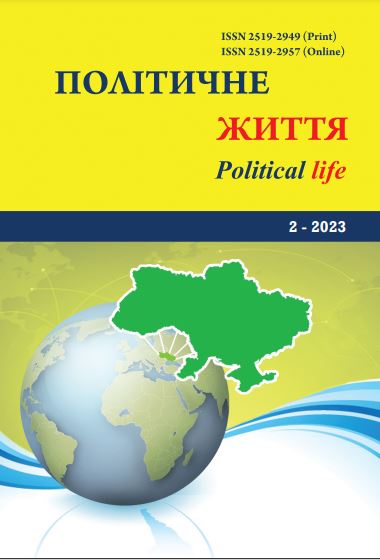Humanitharian aspects of the ecological crysis in Ukraine
DOI:
https://doi.org/10.31558/2519-2949.2023.2.5Keywords:
humanitharian factor; ecological culture; ecological education; environmental beliefs; ecological; “green movement”; ecological informationAbstract
The article is devoted to the analysis of some humanitarian permanent ecological crisis. It has been established that the environmental crisis is the result of the action of many factors. These are the unregulated population growth, the incompetence of the relevant services, the consumerist approach to nature, the environmentally destructive type of industrial development, etc. It is precisely this circumstance that is sought to be taken into account when implementing such strategic environmental initiatives as the adoption of environmental legislation and the signing of a number of new international agreements, a change in the very "vector" of economic development, the creation and spread of environmentally acceptable technologies, stabilization of the world population, etc. And that’s right. But if you look at the problem more deeply, it will turn out that there is another and, perhaps, the most significant reason for the ecological crisis - the global decline of spirituality and morality, the low level of environmental education and upbringing, in general, the ecological culture of the vast majority of the planet’s inhabitants.
It has been defined that optimization of society interaction with natural environment depends from the level of ecological culture of citizens. In this context, the existing definitions of "ecological culture" are analyzed, and its actual interpretation is given. Such components of ecological culture as ecological education, ecological upbringing, and ecological activities are singled out and analyzed. Based on the results of own sociological research, the level of maturity of each of the segments of ecological culture has been demonstrated.
It is noted that the level of ecological culture of citizens determines a kind of "code of conduct", which is the basis of environmental activities. This is a set of knowledge, norms, stereotypes and "rules of behavior" of a person in the natural world around him. It is substantiated that environmental activity is a key element of obtaining environmental education and the formation of environmental beliefs. The role of public environmental movements and objective information in the formation of a mature ecological culture of citizens is indicated.
References
Бiлявський Г.О., Фуpдуй Р. С. Основи екологiчних знань. Київ: Либiдь., 1995. 228 с.
Хилько М.І. Екологізація політики / Монографія. Київ: Вадекс, 2014. 344 с.
Салтовський О.І. Основи соціальної екології: Курс лекцій. Київ: МАУП, 1997. 168 с
Крисаченко В.С. Екологічна культура: теорія і практика. Навч. посібник. Видання друге. Київ: «МП Леся», 2009. 364 с.
Цицерон Марк Тулий. Тускуланские беседы. Избр. соч. Москва: Худ. лит-ра, 1975. 456 с.
Киселев Н.Н. Мировоззрение и экология. Київ: Наукова думка, 1990. 215 с.
Історія філософії. Словник / За заг. ред.В. І. Ярошевця. Київ: Знання України, 2005. 1200 с.
Стегній О.Г. Соціологічне прочитання природи: посібник. Київ: ТОВ «Центр екологічної освіти та інформації», 2012. 436 с.
Конвенція про доступ до інформації, участь громадськості в процесі прийняття рішень та доступ до правосуддя з питань, що стосуються довкілля / Упорядник: Тимочко Т.В.. Ніжин.: ТОВ Вид. «Аспект-Поліграф», 2007. 34 с.

